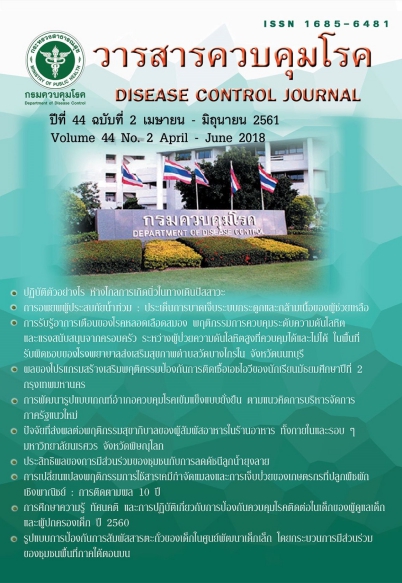Factors affecting the food sanitation behavior among food handlers in food Shops inside and outside Naresuan University, Phitsanulok, Thailand
DOI:
https://doi.org/10.14456/dcj.2018.16Keywords:
food sanitation behavior, food handlers, food shop, universityAbstract
The purpose of this cross-sectional survey study was to determine the factors influencing of food sanitation behavior among 201 food shops inside and outside Naresuan University. Data were randomly collected by simple random sampling by using questionnaire which the Cronbach’s alpha coefficient were 0.86. Stepwise multiple linear regression was used to analyze significant level p-value at 0.05. The results showed that the overall level of the food sanitation behavior of the food handlers shop were at high level ( = 2.47, SD = 0.31, Min = 1.85, Max = 3.00). From four elements of behaviors, environment aspect had the highest score while personal hygiene aspect had the lowest score. Attitude and frequency of attending in the training were significantly associated with food sanitation behavior at the food shops. All of these factors could predict the food sanitation behavior. Therefore, the results suggested that the persons who were relevant to the food sanitation among food handlers should be increasing the level of attitude. Training should be implemented, while enforcement should be continuously provided to food handlers for good practice in food sanitation
Downloads
References
2. สำนักสุขาภิบาลอาหารและน้ำ กรมอนามัย กระทรวงสาธารณสุข. คู่มือการปฏิบัติงานด้านสุขาภิบาลอาหารและน้ำ สำหรับสาธารณสุขอำเภอ. พิมพ์ครั้งที่ 2. กรุงเทพมหานคร: ชุมนุมสหกรณ์การเกษตรแห่งประเทศไทย; 2557.
3. คณะกรรมการอาหารและยา. คุณภาพความปลอดภัย. กรุงเทพมหานคร: สำนักงานเลขานุการคณะกรรมการอาหารแห่งชาติ สำนักอาหาร สำนักงานคณะกรรมการอาหารและยา; 2558.
4. กองสุขาภิบาลอาหาร. คู่มือวิชาการสุขาภิบาลอาหารสำหรับเจ้าหน้าที่. กรุงเทพมหานคร: กรมอนามัย กระทรวงสาธารณสุข; 2556.
5. สุดาวดี ยะสะกะ, พีรญา อึ้งอุดรภักดี, สรัญญา ถี่ป้อม, พันธ์ทิพย์ หินหุ้มเพ็ชร, ณัฐพงศ์ โปรยสุรินทร์. รายงานฉบับสมบูรณ์โครงการอาหารปลอดภัยใส่ใจผู้บริโภค ภายในมหาวิทยาลัยนเรศวร. พิษณุโลก: คณะสาธารณสุขศาสตร์ มหาวิทยาลัยนเรศวร; 2559.
6. ญานิศา ศรีใส, สุดาวดี ยะสะกะ. สถานการณ์การสุขาภิบาลอาหารบริเวณรอบ ๆ มหาวิทยาลัยนเรศวร. วารสารควบคุมโรค 2559;42:327-36.
7. Hair JJF, Black WC, Babin BJ, Anderson RE, Tatham RL. Multivariate data analysis. 6th ed. New Jersey: Pearson Prentice Hall; 2006.
8. คณะกรรมการอาหารแห่งชาติ. กรอบยุทธศาสตร์ การจัดการด้านอาหารของประเทศไทย (ฉบับปรับปรุงครั้งที่ 1). พิมพ์ครั้งที่ 2. นนทบุรี: สำนักงานเลขานุการคณะกรรมการอาหารแห่งชาติ; 2557.
9. ศันสนีย์ เมฆรุ่งเรืองวงศ์, นิทรา กิจธีระวุฒิวงษ์, ชวลิต วโรดมรังสิมันตุ์. สถานการณ์และการบริหารจัดการด้านโภชนาการและสุขาภิบาลอาหาร ของโรงเรียนมัธยมศึกษา จังหวัดพิษณุโลก. พิษณุโลก: คณะสาธารณสุขศาสตร์ มหาวิทยาลัยนเรศวร; 2558.
10. Okojie OH, Wagbatsoma VA, Ighoroge AD. An assessment of food hygiene among food handlers in a Nigerian university campus. Niger Postgrad Med J 2005;12:93-6.
11. กองสุขาภิบาลอนามัย สำนักอนามัย กรุงเทพมหานคร. คู่มือหลักสูตรการสุขาภิบาลอาหารของกรุงเทพมหานคร. พิมพ์ครั้งที่ 2. กรุงเทพมหานคร: สำนักงานพระพุทธศาสนาแห่งชาติ; 2553.
12. Norrakiah AS, Siow ON. Knowledge, attitudes and practices of food handlers on food safety in food service operations at the University Kebangsaan Malaysia. Food Control 2014;37:210-7.
13. Assefa M, Kumie A. Assessment of factors influencing hygiene behaviour among school children in Mereb-Leke District, Northern Ethiopia: a cross-sectional study. BMC Public Health 2014;14:1000.
14. Siow ON, Norrakiah AS. Assessment of knowledge, attitudes and pactices (KAP) among food handlers at residential colleges and canteen regarding food safety. Sains Malaysiana 2011;40:403-10.
15. Lin W, Hang CM, Yang HC, Hung MH. 2005-2008 Nutrition and health survey in Taiwan: the nutrition knowledge, attitude and behavior of 19-64 years old adults. Asia Pac J Clin Nutr 2011;20:309-18.
16. Salminen S, Bouley C, Boutron-Ruault MC, Cummings JH, Franck A, Gibson GR, et al. Functional food science and gastrointestinal physiology and function. Br J Nutr 1998;80:S147-71.
17. นฤมล วีระพันธ์, ปราณี ทองคำ. ปัจจัยที่มีผลต่อสภาวะการสุขาภิบาลอาหารตามหลักเกณฑ์ข้อกำหนดมาตรฐานของร้านอาหารในเขตอำเภอเมือง จังหวัดปัตตานี. วารสารสงขลานครินทร์ ฉบับสังคมศาสตร์และมนุษยศาสตร์ 2550;13:187-200.
18. ฐานิศา สาเบด, ชาญชัย เรืองขจร, กัลยา ตันสกุล. สภาพการสุขาภิบาลอาหารในโรงเรียนเอกชนสอนศาสนาควบคู่สามัญจังหวัดสตูล. วารสารสุขาภิบาลอาหารและน้ำ 2557;5:28-33.
19. Abdul-Mutalib N-A, Abdul-Rashid M-F, Mustafa S, Amin Nordin S, Hamat RA, Osman M. Knowledge, attitude and practices regarding food hygiene and sanitation of food handlers in Kuala Pilah, Malaysia.
Food Control 2012;27:289-93.
20. Tan SL, Bakar FA, Abdul Karim MS, Lee HY, Mahyudin NA. Hand hygiene knowledge, attitudes and practices among food handlers at primary schools in Hulu Langat district, Selangor (Malaysia). Food Control 2013;34:428-35.
21. Wen-Hwa Ko. Food sanitation knowledge, attitude, and behavior for the University Restaurants Employees. Food Nutr Sci 2011;2:744-50.
22. ศันสนีย์ เมฆรุ่งเรืองวงศ์, นิทรา กิจธีระวุฒิวงษ์, ชวลิต วโรดมรังสิมันต์. ปัจจัยที่มีความสัมพันธ์ต่อพฤติกรรมบริโภคอาหารที่ถูกสุขลักษณะในนักเรียนมัธยมศึกษา จังหวัดพิษณุโลก. วารสารวิจัยเเละพัฒนาระบบสุขภาพ 2560;10:205-
12.
23. House JS. Work stress and social support. Reading, MA: Addison-Wesley; 1981.
24. Kibre M, Abera B. The sanitary conditions of food service establishment and food safety knowlege and practice of food handles in Bahir Dar town. Ethiop J Health Sci 2012;22:27-35.
25. Lynch RA, Elldege BL, Griffith CC, Boatright DJ. A comparison of food safety knowledge among restaurant managers, by source of training and experience, in Oklahoma Country, Oklahoma. J Environl Health 2003;66:9-14.
26. Gillespie I, Little C, Mitchell R. Mirobiological examination of cold ready-to-eat sliced meats from catering establishments in the United Kingdom. J Appl Microbiol 2000;88:467-74.
27. สมโภชน์ เอี่ยมสุภาษิต. ทฤษฏีและเทคนิคการปรับพฤติกรรม. กรุงเทพมหานคร: จุฬาลงกรณ์มหาวิทยาลัย; 2541.
Downloads
Published
How to Cite
Issue
Section
License
Articles published in the Disease Control Journal are considered as academic work, research or analysis of the personal opinion of the authors, not the opinion of the Thailand Department of Disease Control or editorial team. The authors must be responsible for their articles.






